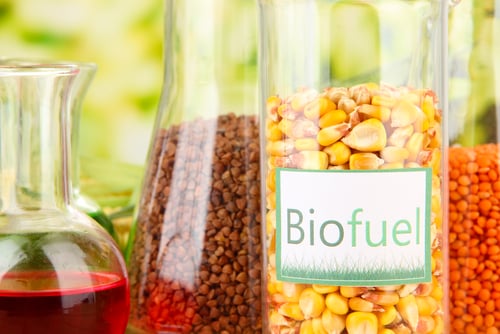Low commodity prices, plummeting RIN values, and talk of potential trade wars are all factors hitting the US Agricultural Sector hard this year.
ESG & Industry Updates
EPA Finalizes 2018 RFS Volume,Declines Obligated Party Change Proposal
Posted by Ed Burke on Dec 1, 2017 5:22:05 PM
Yesterday (November 30th) the EPA finalized renewable volume obligations for the RFS for 2018 and the RVO levels for 2019.
Topics: EPA Mandate, RINs, Biofuels, Cellulosic Ethanol, EPA, RFS
Grassy Hillsides plowed into crop rows. Millions of acres of conservation land converted to corn fields. Fertilizer runoff polluting lakes and streams. All to produce a "green" fuel source.... Or that's the picture painted by an AP article slash expose anyway.
Topics: E85, Ethanol, EPA Mandate, RINs, Biofuels, EPA, Blend Wall, RFS
RIN Price Spikes sustaining the "Pain at the Pump" for Gasoline
Posted by Ed Burke on May 30, 2013 8:57:00 AM
I wrote an article for Oil & Energy Magazine regarding RIN values and their impact on gasoline prices - Good time for a look over, as we officially head into "driving season"...
Topics: Oil & Energy Magazine, RINs
I wrote an article in March's issue of Oil & Energy Magazine adressing the issue of RIN Fraud and the impact the EPA crackdown on the fraud is having in the biodiesel world.
Topics: Oil & Energy Magazine, Biodiesel, RINs
As we start 2011, God Bless America!
Topics: Solar, massachusetts biodiesel mandate, Biodiesel Tax Credit, Biodiesel, RINs
Subscribe to Email Updates
Recent Posts
Posts by Topic
- Carbon Emissions (42)
- Climate Change (33)
- renewable energy (32)
- Oil & Energy Magazine (27)
- EPA (24)
- Massachusetts (22)
- Biden Administration (18)
- decarbonization (15)
- Biodiesel (12)
- natural gas (12)
- EPA Mandate (11)
- RFS (11)
- Solar (11)
- Biofuels (10)
- Keystone XL (10)
- methane (10)
- Clean Energy (9)
- offshore wind (9)
- Energy Independence (8)
- Energy Infrastructure (8)
- Safety (8)
- Biodiesel Tax Credit (7)
- Emissions (7)
- Ethanol (7)
- Trump Administration (7)
- ev (7)
- Cellulosic Ethanol (6)
- EV Charger (6)
- Inflation Reduction Act (6)
- RINs (6)
- environmental justice (6)
- Fracking (5)
- Technology (5)
- US Crude Exports (5)
- Utility Rates (5)
- electric vehicles (5)
- maine (5)
- tesla (5)
- ACT (4)
- Mass DOER (4)
- TransCanada (4)
- battery (4)
- fuel management (4)
- massachusetts biodiesel mandate (4)
- obama (4)
- paris accord (4)
- remote tank monitoring (4)
- CARB (3)
- CRUDE (3)
- Carbon Capture (3)
- Clean Fuel Production Credit (3)
- E85 (3)
- Emergency Fuel (3)
- Massachusetts Clean Cities (3)
- Waste Feedstock Biodiesel (3)
- china (3)
- clean power plan (3)
- electricity rates (3)
- net-zero (3)
- renewable diesel (3)
- solid state battery (3)
- AI (2)
- AVs (2)
- Bioheat (2)
- Commodities (2)
- Congress (2)
- Customer Service (2)
- DOT (2)
- EIA (2)
- Emergency Generator Program (2)
- HFCs (2)
- Hurricane Sandy (2)
- IMO 2020 (2)
- MIT (2)
- Marinas (2)
- New York (2)
- Refinery Closures (2)
- Safe Driving Policy (2)
- TCI (2)
- US Energy Boom (2)
- ZEV (2)
- autonomous vehicles (2)
- clean air act (2)
- clean heat standard (2)
- coal (2)
- driver shortage (2)
- emergency response (2)
- environment (2)
- ferc (2)
- geothermal (2)
- hydro-electric (2)
- hydrogen (2)
- national grid (2)
- net metering (2)
- power plant emissions (2)
- power plants (2)
- railcar regulations (2)
- tariff (2)
- vineyard wind (2)
- API (1)
- Air conditioning (1)
- Baiji Refinery (1)
- Blend Wall (1)
- Brent Crude (1)
- Brent vs WTI (1)
- CFCs (1)
- Cell Phone Policy (1)
- Clean Water Act (1)
- DEF (1)
- Election Results (1)
- Electrical Grid (1)
- Energy Efficiency (1)
- Environmental Impact Study (1)
- Environmentally Friendly Products (1)
- Ethanol Tax Credit (1)
- FEMA (1)
- Fiscal Cliff (1)
- Gas Tax (1)
- Gasoline Supply Crunch (1)
- HDVC (1)
- Hazmat (1)
- Heat Tax (1)
- Highway Trust Fund (1)
- Holyoke (1)
- Hybrid (1)
- ISIS (1)
- Iraq (1)
- Kigali Amendment (1)
- MOC (1)
- Market analysis (1)
- Mayflower (1)
- Montreal Protocol (1)
- NORA (1)
- Natural Gas Pipeline Explosion (1)
- New Jersey (1)
- OBB (1)
- Oil Barrel Tax (1)
- PFC (1)
- Pegasus Pipeline (1)
- Propane Autogas (1)
- Stimulus (1)
- Syria (1)
- Tank Truck Safety Training (1)
- Tax Increases (1)
- Tier 3 Gasoline Standard (1)
- Times Square (1)
- VEEP (1)
- Workplace Risk (1)
- agriculture (1)
- algonquin pipeline (1)
- alternative energy (1)
- altwheels (1)
- astm (1)
- bionic leaf (1)
- bitcoin (1)
- boston (1)
- covid-19 (1)
- energy storage (1)
- eversource (1)
- export ban (1)
- fixed pricing (1)
- fuel (1)
- fuel efficiency (1)
- fuel marketers news (1)
- gas leaks (1)
- heating oil (1)
- hurricane harvey (1)
- inflation (1)
- irving oil (1)
- marketing (1)
- nuclear (1)
- online fuel buying (1)
- ozone (1)
- photovoltaic (1)
- pilot program (1)
- pipeline (1)
- propane (1)
- renewable natural gas (1)
- rggi (1)
- russia (1)
- sanctions (1)
- senate (1)
- shale (1)
- social media (1)
- social media for business (1)
- space (1)
- tablets (1)
- tennessee pipeline (1)
- ukraine, (1)
- value added services (1)


